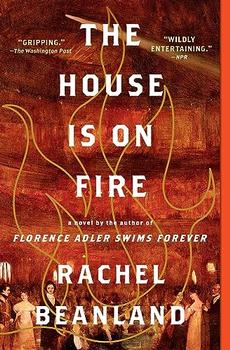Summary | Excerpt | Reviews | Beyond the Book | Readalikes | Genres & Themes | Author Bio

Sally had been disappointed when her father returned and their conversation was cut short. But then, less than a fortnight later, Robert returned to Red Hill with a special-ordered horse saddle for her father and a copy of Rowson's play Slaves in Algiers for her.
"It's not a novel," said Robert, "but it's clear she's got something to say."
After that, there had been a steady stream of books. On each of Robert's visits, after he finished his business with Sally's father, he came to find her. And, for her part, Sally made herself easy to find.
Sally's father grew ill the winter she turned nineteen. As spring turned to summer and his condition worsened, the stream of visitors to Red Hill slowed to a trickle. Still, Robert continued to ride out to the property, eventually giving up even the pretense that he had business with her father.
On one visit, he brought Sally his brother Tom's poetry collection, The Pleasures of Hope, which had just been published in Edinburgh to some acclaim. She read the poems several times over and eventually realized that she had stopped paying attention to the language—which was lovely—and had instead started to mine the book for details about Robert's childhood in Glasgow.
There was one line that she hadn't been able to put out of her mind, and she asked Robert about it on his next visit, when he found her under a honey locust tree, near the herb garden. "There's this part about 'the brother of his childhood,' who 'seems restored a while in every pleasing dream.' Is he writing about someone in particular?"
Robert inspected his hands. "Aye. About our brother Jamie. He drowned in the Clyde when he was thirteen."
"I'm sorry."
"My brother Archie and I were already in Berbice. But Tom was six, and he was the one who found him. First his clothes, and then his body, a little further down the river."
Sally had also lost brothers, and on days when she was being honest with herself, she could acknowledge that her father's condition was worsening and that, soon, she would lose him, too. She felt a sudden urge to wrap her arms around Robert, to tell him that she knew something of the "hopeless tears" his brother described.
But all she said was "It's a beautiful poem."
It hadn't occurred to Sally, before she met Robert, that marriage might be anything other than a series of duties, performed over a procession of years, but when they married, she had been pleasantly surprised to find she'd been wrong. In Marysville, where Robert had rented a house for them, there was plenty of work to fill her days, but there were also long, dark nights when she curled against her husband's chest, listening to the soft thud of his heart as he read to her by the glow of a lamp. It wasn't a bad way to be introduced to the French philosophers, all things considered.
There is a logjam in the third-floor lobby, where everyone has stopped to examine their tickets and confirm their box numbers. "We're this way," says Margaret, plowing her way across the lobby and down one of the long, narrow hallways that wraps around the building. Sally follows close behind.
"Pardon me," she says as she turns sideways to let a wide-hipped woman, coming from the opposite direction, pass. Behind her, the hallway is empty.
"We've lost Archie," Sally calls to Margaret as she hurries to catch up.
Margaret waves a hand over her shoulder. "I'm sure he got stuck talking to someone. He'll find us."
Archie is a factor and shareholder with Buchanan, Hopkirk & Co., one of Glasgow's oldest and largest tobacco houses. The company has fourteen stores in Virginia, where planters can bring their gold leaf tobacco to sell, and in return, buy a fine assortment of imported goods against their ever-expanding lines of credit. Robert ran the store in Marysville, but his older brother's role is far larger. Not only does Archie oversee all the company's storekeepers, but its warehouses, too. With ships from Glasgow arriving all the time—either via the Potomac, the Rappahannock, or the James—it is advantageous for the company to maintain warehouses up and down the state's fall line, which means Archie regularly travels between Richmond and Petersburg, Fredericksburg and Falmouth. Sally knows Margaret grows weary of it, and that she is especially grateful for the winter months, when all of his clients come to him.
Excerpted from The House Is on Fire by Rachel Beanland. Copyright © 2023 by Rachel Beanland. Excerpted by permission of Simon & Schuster. All rights reserved. No part of this excerpt may be reproduced or reprinted without permission in writing from the publisher.




Wisdom is the reward you get for a lifetime of listening when you'd rather have been talking
Click Here to find out who said this, as well as discovering other famous literary quotes!
Your guide toexceptional books
BookBrowse seeks out and recommends the best in contemporary fiction and nonfiction—books that not only engage and entertain but also deepen our understanding of ourselves and the world around us.